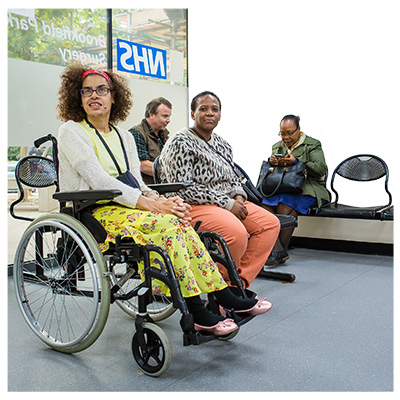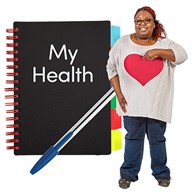Supporting the NHS with the Health Action Group
 We recently shared our views on the NHS long term plan which was published on 28 January. We’ve asked some of our staff for their views on the issues that were covered by the plan, in relation to their areas of work. One of our team leaders, Heather Arthur, sits on a Health Action Group (HAG) in Gloucestershire which aims to help the NHS deliver better healthcare for people with a learning disability, autism, or both.
We recently shared our views on the NHS long term plan which was published on 28 January. We’ve asked some of our staff for their views on the issues that were covered by the plan, in relation to their areas of work. One of our team leaders, Heather Arthur, sits on a Health Action Group (HAG) in Gloucestershire which aims to help the NHS deliver better healthcare for people with a learning disability, autism, or both.
In the blog below, Heather shares her thoughts on the work of the group and what it has achieved to date.
Can you tell us about the Health Action Group – what is it and what does it set out to do?
The group meets every other month to discuss issues relating to health and access to services, with Inclusion Gloucestershire, the Innovation Team, 2gether NHS Foundation Trust, and the Partnership Board.
People come to ask for advice and opinions on key issues. For example, a speech and language therapist visited us to ask us how best to present information on a leaflet they were writing about dysphasia.
The Health Action Group is part of a ‘web’ of groups, across the country. Attendees include commissioners, safeguarding professionals, occupational therapists, consultants, learning disability matrons, practice nurses, plus speakers on ‘hot topics’. They give people with a learning disability, autism, or both, the opportunity to have their voice heard.
How long have you been going?
I’ve been attending the group, which includes people who use services and healthcare professionals, for about two years.
What successes has the group had?
 The group has achieved a lot over the last few years, for example we’ve:
The group has achieved a lot over the last few years, for example we’ve:
- Helped plan The Learning Disabilities Big Health Check and Social Care Open Day, an annual event taking place on 22 May.
- Sampled and fed back on videos about making hospital/GP/epilepsy nurse visits by Inclusion Gloucestershire.
- Established the Annual Health Check, which is now mandatory, and all GP surgeries have to offer one to everyone with a learning disability.
- Shaped training for GPs in supporting people with learning disabilities.
Shared best practice regarding STOMP. - Shaped the Hospital Passport, which is now in use in Gloucestershire.
Why is it important and what are you proud of?
The influence of the group and Simon, who is the strategic health facilitator and chair of the group, has helped put equal healthcare for people with learning disabilities on the radar. GPs are more aware of support needs and now offer Annual Health Checks – which also highlight when people need regular support and screening.
 Recently, I’ve raised the issue of support when people are in hospital. The group has produced the Hospital Passport, which outlines each person’s individual support needs. This should be read by all staff who are supporting the person. Our experience is that this doesn’t always happen as they do not have time.
Recently, I’ve raised the issue of support when people are in hospital. The group has produced the Hospital Passport, which outlines each person’s individual support needs. This should be read by all staff who are supporting the person. Our experience is that this doesn’t always happen as they do not have time.
People going into hospital can be faced with being there with no staff support for long periods – we used to be able to stay with someone 24 hours a day – now with the specific contact hours funding, we cannot always be there, there are no ‘health’ hours built into the system. We support people in our own time. It is vital that hospital staff have information about individuals.
I discussed this with the group and the hospital liaison nurse. We suggested that signage was placed above the bed to indicate support needs. The liaison nurse took this to the hospital steering group meeting. They thought too much signage would be confusing but have agreed to use a Hospital Passport symbol – to ensure all staff know about and read it.
Following that, I asked if I could join the hospital steering group and attend meetings. They have agreed to this. Again, we will be the only care organisation represented.
Sharing experience
If you’re a Brandon member of staff and you have some topics for future meetings, or examples of how you’ve overcome challenges in your area, please contact communications@brandontrust.org

